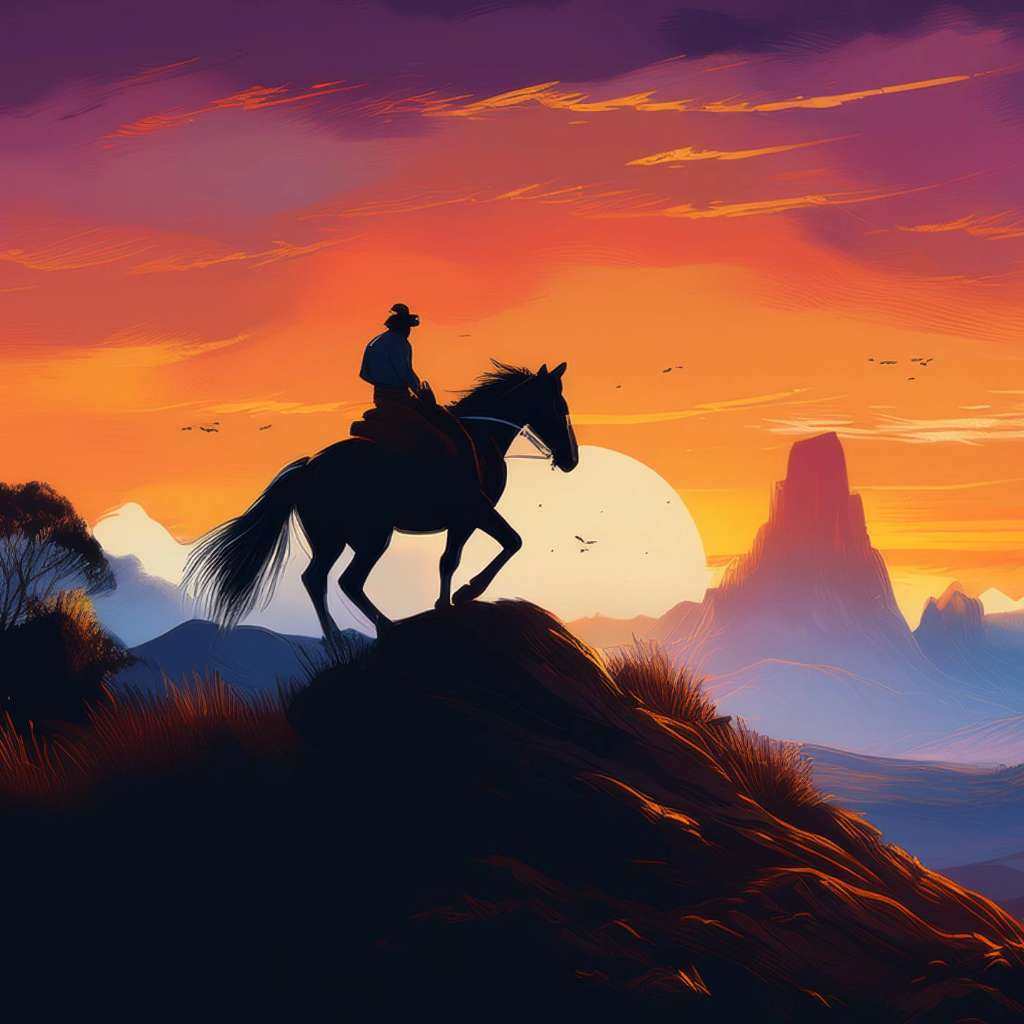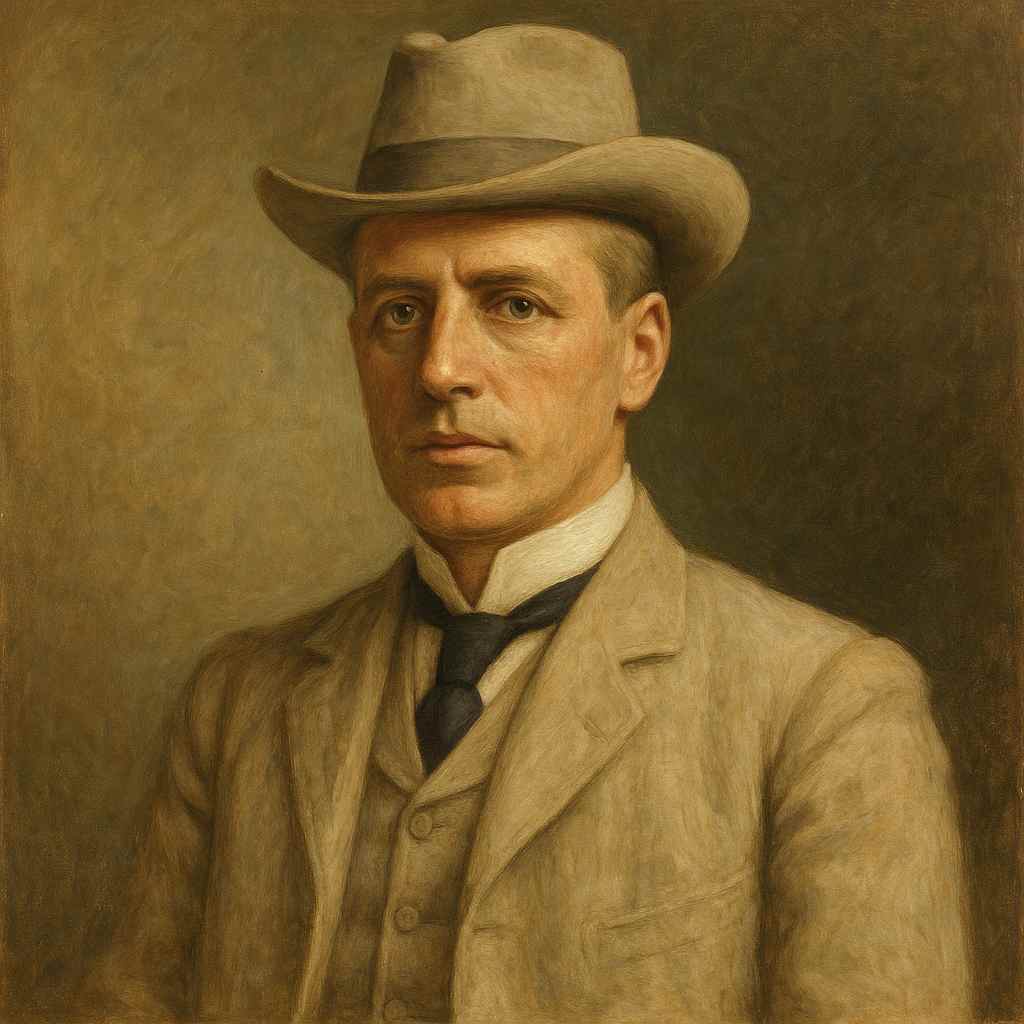The Man from Snowy River
Banjo Paterson
1864 to 1941

There was movement at the station, for the word had passed around
That the colt from Old Regret had got away,
And had joined the wild bush horses - he was worth a thousand pound,
So all the cracks had gathered to the fray.
All the tried and noted riders from the stations near and far
Had mustered at the homestead overnight,
For the bushmen love hard riding where the wild bush horses are,
And the stock-horse snuffs the battle with delight.
There was Harrison, who made his pile when Pardon won the cup,
The old man with his hair as white as snow;
But few could ride beside him when his blood was fairly up —
He would go wherever horse and man could go.
And Clancy of the Overflow came down to lend a hand,
No better horseman ever held the reins;
For never horse could throw him while the saddle girths would stand,
He learnt to ride while droving on the plains.
And one was there, a stripling on a small and weedy beast;
He was something like a racehorse undersized,
With a touch of Timor pony — three parts thoroughbred at least —
And such as are by mountain horsemen prized.
He was hard and tough and wiry — just the sort that won't say die —
There was courage in his quick impatient tread;
And he bore the badge of gameness in his bright and fiery eye,
And the proud and lofty carriage of his head.
But still so slight and weedy, one would doubt his power to stay,
And the old man said, "That horse will never do
For a long and tiring gallop - lad, you'd better stop away,
Those hills are far too rough for such as you."
So he waited sad and wistful — only Clancy stood his friend —
"I think we ought to let him come," he said;
"I warrant he'll be with us when he's wanted at the end,
For both his horse and he are mountain bred."
"He hails from Snowy River, up by Kosciusko's side,
Where the hills are twice as steep and twice as rough,
Where a horse's hoofs strike firelight from the flint stones every stride,
The man that holds his own is good enough.
And the Snowy River riders on the mountains make their home,
Where the river runs those giant hills between;
I have seen full many horsemen since I first commenced to roam,
But nowhere yet such horsemen have I seen."
So he went; they found the horses by the big mimosa clump,
They raced away towards the mountain's brow,
And the old man gave his orders, "Boys, go at them from the jump,
No use to try for fancy riding now.
And, Clancy, you must wheel them, try and wheel them to the right.
Ride boldly, lad, and never fear the spills,
For never yet was rider that could keep the mob in sight,
If once they gain the shelter of those hills."
So Clancy rode to wheel them — he was racing on the wing
Where the best and boldest riders take their place,
And he raced his stockhorse past them, and he made the ranges ring
With the stockwhip, as he met them face to face.
Then they halted for a moment, while he swung the dreaded lash,
But they saw their well-loved mountain full in view,
And they charged beneath the stockwhip with a sharp and sudden dash,
And off into the mountain scrub they flew.
Then fast the horsemen followed, where the gorges deep and black
Resounded to the thunder of their tread,
And the stockwhips woke the echoes, and they fiercely answered back
From cliffs and crags that beetled overhead.
And upward, ever upward, the wild horses held their way,
Where Mountain Ash and Kurrajong grew wide;
And the old man muttered fiercely, "We may bid the mob good day,
No man can hold them down the other side."
When they reached the mountain's summit, even Clancy took a pull -
It well might make the boldest hold their breath;
The wild hop scrub grew thickly, and the hidden ground was full
Of wombat holes, and any slip was death.
But the man from Snowy River let the pony have his head,
And he swung his stockwhip round and gave a cheer,
And he raced him down the mountain like a torrent down its bed,
While the others stood and watched in very fear.
He sent the flint-stones flying, but the pony kept his feet,
He cleared the fallen timbers in his stride,
And the man from Snowy River never shifted in his seat —
It was grand to see that mountain horseman ride.
Through the stringy barks and saplings, on the rough and broken ground,
Down the hillside at a racing pace he went;
And he never drew the bridle till he landed safe and sound,
At the bottom of that terrible descent.
He was right among the horses as they climbed the farther hill
And the watchers on the mountain standing mute,
Saw him ply the stockwhip fiercely; he was right among them still,
As he raced across the clearing in pursuit.
Then they lost him for a moment, where two mountain gullies met
In the ranges - but a final glimpse reveals
On a dim and distant hillside the wild horses racing yet,
With the man from Snowy River at their heels.
And he ran them single-handed till their sides were white with foam.
He followed like a bloodhound on their track,
Till they halted cowed and beaten, then he turned their heads for home,
And alone and unassisted brought them back.
But his hardy mountain pony he could scarcely raise a trot,
He was blood from hip to shoulder from the spur;
But his pluck was still undaunted, and his courage fiery hot,
For never yet was mountain horse a cur.
And down by Kosciusko, where the pine-clad ridges raise
Their torn and rugged battlements on high,
Where the air is clear as crystal, and the white stars fairly blaze
At midnight in the cold and frosty sky,
And where around the Overflow the reed -beds sweep and sway
To the breezes, and the rolling plains are wide,
The man from Snowy River is a household word today,
And the stockmen tell the story of his ride.
Banjo Paterson's The Man from Snowy River
Banjo Paterson's The Man from Snowy River is a quintessential Australian bush ballad that captures the spirit of the nation's pioneering past and celebrates the skill and bravery of its horsemen. Through vivid imagery and stirring narrative, Paterson weaves a tale that not only recounts a thrilling chase but also embodies the values and identity of rural Australia.
The poem opens with a scene of excitement and anticipation. A valuable colt has escaped and joined a mob of wild horses, prompting the gathering of skilled riders from far and wide. This initial stanza sets the stage for the adventure to come and introduces the reader to the world of the Australian bush, where horsemanship is highly prized and the challenge of taming the wilderness is ever-present.
Paterson then introduces a cast of characters, each representing different aspects of bush life. Harrison, the wealthy old-timer, symbolizes the potential for success in this harsh environment. Clancy of the Overflow, a character who appears in other Paterson works, embodies the ideal bushman - skilled, respected, and at home in the rugged landscape. These figures serve as a backdrop against which the true hero of the story will emerge.
The protagonist, the man from Snowy River, is introduced in stark contrast to these established figures. Described as a stripling on a small and weedy beast, he initially appears unsuited to the task at hand. However, Paterson's description hints at hidden strengths, noting the horse's thoroughbred lineage and the rider's wiry toughness and gameness. This juxtaposition of appearance and underlying quality is a recurring theme in Australian folklore, celebrating the underdog and the idea that true worth lies beneath the surface.
The old man's dismissal of the young rider and Clancy's defense of him create tension and set up the central conflict of the poem. This exchange also serves to establish the man from Snowy River's background, emphasizing the extreme conditions of his home and the unique skills they have fostered in him. The line Where a horse's hoofs strike firelight from the flint stones every stride vividly illustrates the challenging terrain and foreshadows the intense action to come.
As the chase begins, Paterson's mastery of pacing becomes evident. The mounting excitement is reflected in the increasingly dynamic language and imagery. The use of words like raced, charged, and flew creates a sense of speed and urgency. The landscape itself becomes a character in the story, with the gorges deep and black and cliffs and crags that beetled overhead emphasizing the danger and drama of the pursuit.
The climax of the poem occurs as the mob reaches the mountain's summit. The shift in tempo here is palpable, with even the experienced Clancy pausing in the face of the treacherous descent. The description of the wild hop scrub and hidden wombat holes underscores the peril of the situation. It is at this moment that the man from Snowy River proves his worth, fearlessly racing down the mountain in a display of unparalleled horsemanship.
Paterson's vivid imagery reaches its peak in the description of this descent. The flint-stones flying and the pony keeping his feet create a visceral sense of the speed and danger involved. The line It was grand to see that mountain horseman ride encapsulates the awe and admiration that the spectators - and by extension, the reader - feel for this feat of skill and bravery.
The poem's resolution sees the man from Snowy River single-handedly rounding up the mob and returning triumphant. The emphasis on his solitary achievement and the beaten state of his pony serve to further elevate his status as a hero. The final stanzas, which describe the lasting legacy of this ride, transform the event from a simple horse chase into a legend, cementing the man from Snowy River's place in the pantheon of Australian folk heroes.
Throughout the poem, Paterson employs a consistent ABAB rhyme scheme and a galloping rhythm that mirrors the movement of horses. This structure, combined with his use of colloquial language and bush terminology, creates an authentic voice that resonates with the Australian experience.
In conclusion, The Man from Snowy River is more than just a tale of a daring horse chase. It is a celebration of Australian identity, championing the values of courage, skill, and perseverance in the face of adversity. Through his masterful use of language, rhythm, and imagery, Banjo Paterson has created a timeless work that continues to capture the imagination and spirit of Australia.
This text was generated by AI and is for reference only. Learn more
Want to join the discussion? Reopen or create a unique username to comment. No personal details required!



Comments
No comments yet. Be the first to comment!